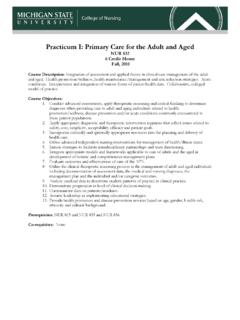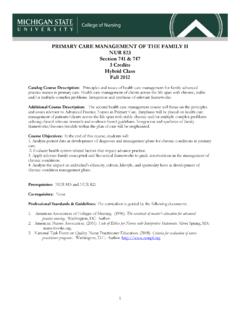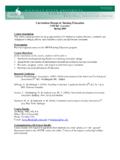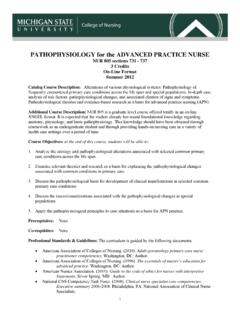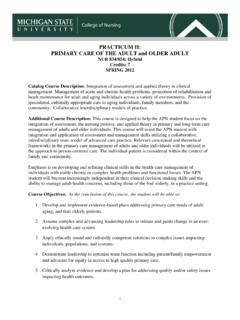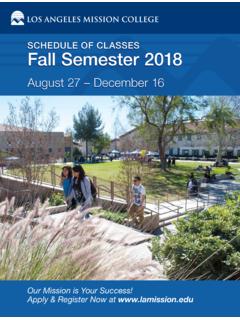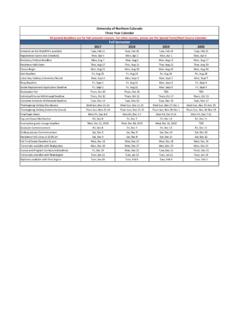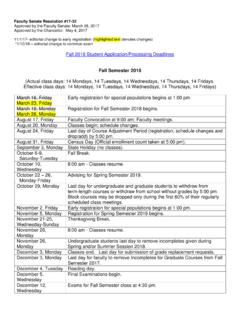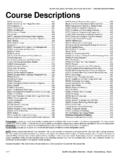Transcription of NUR 823 Fall 2004 Syllabus - College of Nursing
1 Michigan State University College of Nursing fall 2004 NUR 823 Syllabus Primary Care Management of the Adult II Credits: 3 Class Time: Thursdays from 1:10 4:00 pm East Lansing: 1208 Engineering Building (Codec) Kalamazoo: 5420 Kalamazoo Valley Community College (Codec) course Chairperson: Kathy Dontje, MSN, APRN, BC, FNP Assistant Professor Contact Information: Office Telephone: 517-432-0023 College Toll-Free: 1-800-605-6424 Office: A207 Life Sciences Building E-mail Address: 2 Michigan State University College of Nursing NUR 823 Syllabus Primary Care Management of the Family II fall 2004 course Number: NUR 823 course Title: Primiary Care Management of the Family II course Placement: fall semester Pre-Requisite: Successful completion of NUR 821 course Description The second health care management course will focus on the principles and issues relevant to Advanced Practice Nurses in Primary Care.
2 Emphasis will be placed on health care management of clients across the life span with stable chronic and/or multiple complex problems utilizing clinical relevant research and guidelines. Integration and synthesis of family framework(s) within the plan of care will be emphasized. course Objectives 1. Develop management plan(s) based on established protocols for individuals across the life span that reflect diverse populations presenting with stable chronic and/or multi-complex primary care conditions. 2. Apply relevant family and related conceptual and theoretical frameworks in management of chronic stable and/or multi-complex primary care conditions. 3. Evaluate the standards of practice and outcomes identified by the contemporary health care delivery systems for the focus population.
3 3 4. Demonstrates cultural competence related to the individual s ethnicity, culture and lifestyle when providing care for individuals in clinical setting. 5. Describe practice issues and/or areas which need further research. Required Texts Ackley, , & Ladwig, (2002). Nursing diagnosis handbook: A guide to planning care (5th ed.). St. Louis, MO: Mosby, Inc. Uphold, , & Graham, (2002). Clinical Guidelines in Family Practice (4rd ed.). Gainesville, FL: Barmarrae Books. Learning Methodologies As adult learners, it is expected that students will do relevant reading and study prior to class on the topic areas identified on the course calendar. Faculty directed readings and web links may be provided for specific content areas and will be found in the Angel web-based chat room.
4 Students will also be expected to search the literature and share their findings with the rest of the students and faculty. Lecture format will be used on a limited basis. The majority of content will be in the form of application of content to case studies with emphasis on evidence-based practice. Students are expected to be active participants in both the classroom and in the Angel discussion chat room. Use of Angel, via the web-based classroom, is an expectation of all students. This includes the Angel Discussion Room, which will have parameters that need to be followed. The quality of your participation in both Angel and classroom discussion will be considered in determining your final score if the final points accrued are very close to the next grade.
5 4 Class schedule The following two pages detail the course schedule for this semester . Please refer to it often to stay on schedule . Evaluation A grade of must be achieved in order to pass NUR823. The MSU grading system will be utilized to report final course grades. At the end of this Syllabus you will find the Evaluation of Participation Form that will be used to determine your final grade by the instructor. The following point scale will be utilized for final grade determination: Subject Area Points Possible Midterm Examination 100 Final Examination 170 Participation 30 Quizzes 50 Project 50 Total Points Possible 400 Point Range(Low High) Grade 376 - 400 348 375 320 347 (Passing 80%) 300 319 280 299 5 fall 2004 course schedule NUR823/853 (Topics.)
6 3 hours) Date Topic FamilyAdult Mode Sept 2 Communicable Diseases (TB, HIV, hepatitis, meningitis) X X CODEC Salisbury Sept 9 Cardiovascular Conditions (Heart Failure & HTN) X X CODEC Sept 16 Radiology (reading x-rays, US, CT scan, MRI, Cardiovascular imaging) X X CODEC Robinson Sept 23 Abdominal Conditions (diarrhea, constipation, GERD, diverticulum, vomiting) X X CODEC Sept 30 Depression / Anxiety / Mood Disorders X X CODEC Oct 7 Dementia & Delirium (Keilman) Mental Health Issues (ADHD, ADD, Dementia, Delirium) X X CODEC and Online Oct 14 Neurological Disorders (seizure, paresthesia, Bell s Palsy, MS, ALS, Parkinsonism, tremors) X X CODEC Wehner Oct 21 MIDTERM Classroom (Continued on following page) 6 fall 2004 course schedule NUR823/853 (Topics.
7 3 hours) (Continued from previous page) Date Topic FamilyAdult Mode Oct 28 Endocrine Disorders DM (classroom), Thyroid (online) X X CODEC (Conrad) Nov 4 Respiratory Conditions (COPD, asthma) X X CODEC Nov 11 Dizziness, Vertigo, Syncope X X CODEC Nov 18 Pediatrics PVD (wound management) X X CODEC FAMILY On-line Nov 20 TURKEY DAY Issues of Nutrition X X On-line Dec 2 Muscle & Bone Disorders (arthritis, fibromyalsia, chronic fatigue syndrome, Epstein Barr virus, gout, polymyalgia) X X CODEC Dec 9 Palliative Care, End of Life Issues X X CODEC (Keilman) Dec 16 FINAL EXAM Classroom 7 NUR 823/853 Evaluation of Participation fall 2004 Student Name: _____ Date: ____/____/____ Thirty (30) points of the total grade for this course will be for active class & Angel (list serve) participation.
8 The following criteria will be utilized by faculty to determine the extent and quality of your involvement and contribution to the class. CRITERIA Points Possible Points Earned Offered pertinent, quality information on specific topics covered by course faculty that helped to enrich the learning environment. Shared pertinent clinical experience or stories Shared web sites, articles, books, etc. Demonstrated respect for faculty and colleagues Questions demonstrated thought, synthesis and reasoning Ideas were creative, original and demonstrated insight 10 Actively contributed to the learning environment by asking relevant questions in a respectful, courteous, and professional manner. Mutuality Competence Active listening Integration of ideas Evidence based 10 Angel participation Evidence of interaction and participation (frequency) Substance and quality vs.
9 Quantity 10 TOTALS30 Comments.
